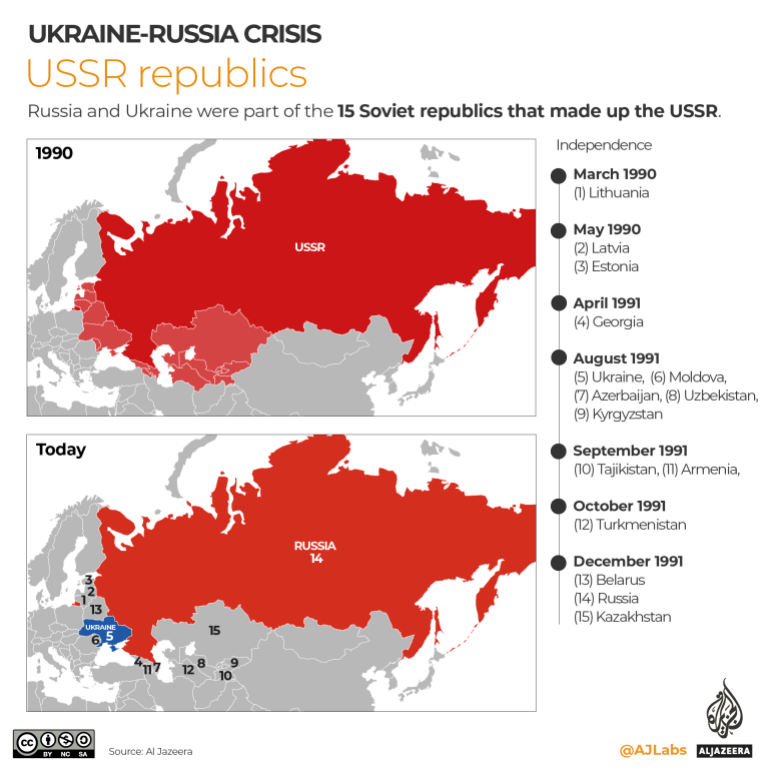As I mentioned before, USSR consisted of 15 Soviet Socialist Republics that like the 50 US States. Just like the US States, each Republic had their own parliament and other governmental structures. Back during the uncontested elections time, the party always preselected only loyal candidates to all positions and could be confident that whoever runs these institutions would just tow the party line without any deviations.
Now that opposition bill has passed federal parliament, a free election to these republics could produce all sorts of unexpected outcomes. Very anti-Soviet republics such as Lithuania or even Georgia might even get nationalist pro-independence majorities. In fact, Lithuania actually held their elections before the bill and achieved just such a majority. Nominally communists won a lot of seats, but the reality was that some officially communist candidates were actually pro-independence.
In fact, some time before the elections Lithuania Communist Party (Lithuanian branch of CPSU), actually voted by majority of party members to separate from CPSU and adopt course for independence. Ironically enough it was those who disagreed with this decision and wanted to remain loyal to Moscow had to quit the official communist party and form their own separate party. Gorbachev criticized Brazauskas for breaking ties with Moscow but there was nothing he could do about it. Lithuania was the first to declare its independence from USSR, shortly before Gorbachev could assume powers of newly created office of President of USSR.
However, Lithuania, other Baltic Republics and Georgia were exceptions. Most of the remaining Republics were unlikely to produce such a clear pro-independence majority and follow Lithuanian footsteps. Thus, Gorbachev still retained possibility that it all will be nothing more than a minor incident in few small republics and no one of real importance would follow the suit.
However, there was one other loophole that he could not have foreseen, RSFSR. RSFSR (Russian Socialist Federative Socialist Republic) was the core of USSR, much like Prussia was in German Empire and later Weimar Republic. RSFSR held half of USSR total population and around 3/4 of the territory. RSFSR too had its own institutions, but unlike other 14 Republics, it shared capital with the USSR itself. The institutions of both structures were often couple of streets away from each other.
RSFSR too held its first free election in 1990. At first glance they did not produce anything extraordinary, however that solid communist majority was misleading.
Over the long life of USSR Communist party slowly evolved from a grouping of people with similar ideologies into a gargantuan structure people were joining simply to make career and get somewhere in life. There were still some ideologically loyal communists, but majority were a divorce group of people that had anything from career builders to ambitious opportunists to even dedicated anti-communists.
While these diverse group was unwilling to simply declare their independence or cancel socialism, just like Lithuanians did, they still were open to consider various lucrative proposals. Yeltsin was part of this system and the party long enough to understand its inner workings and know what to say and do to they them support him. At the same time, due to his fall from power due to his falling out with Gorbachev, and then sudden return to it with the help of the opposition and later Interregional group, he had vested interests in defeating Gorbachev together with USSR and CPSU gone.
Unlike federal parliament, RSFSR one did not have Gorbachev's own person to oppose Yeltsin and Interregional opposition personally. Because traditionally RSFSR structures were left to play a second fiddle to USSR's ones, there were no any notable politicians in RSFSR structures. The opposition decided to take advantage of that, get themselves elected to RSFSR parliament and then rally the MPs behind themselves.
So, after winning a seat in parliament of RSFSR, Yeltsin decided to go to run for position of the parliamentary speaker, RSFSR equivalent of the Gorbachev's own office in USSR parliament. To be precise, the office Gorbachev held until in 1990 he created the office of President of USSR, transferred head of the state powers there and left Lukyanov to do purely speaker's job as President of Supreme Soviet.
In both USSR and RSFSR the position actually combined powers of the speaker with that of formal head of the state, kind of speaker and governor-general in one. The title was President of the Supreme Soviet of the USSR (of RSFSR in Yeltsin's case). Thus, in a shifting political landscape this was considered a most senior leadership role in their respective bureaucracies.
RSFSR MPs had to choose between plain and boring Gorbi loyalist, Ryzhkov, who would not promise them anything and Yeltsin who had charisma and drive to get them all somewhere.
Vote was hard and contentious, first several attempts did not produce a victory to either candidate. Gorbachev even went on to address the RSFSR parliament to encourage them to vote for Ryzhkov, but to no avail. Eventually Yeltsin narrowly won.
This was a major victory for Yeltsin; however, it would be his next move that would take USSR to the point of no return and trigger so called Parade of Sovereignties. Why it did so of course require another article to explain.



No comments:
Post a Comment